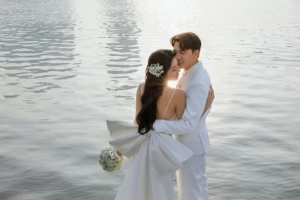The Surprising Secret to a Lasting Love: Embracing the Perpetual Journey of Becoming
Love, in its myriad forms, has captivated and confounded humanity for millennia. From the fleeting flutters of infatuation to the deep-rooted security of lifelong companionship, we strive to understand its elusive nature and unlock the secrets to its longevity. While popular culture often peddles simplistic formulas of romance and instant connection, the reality of lasting love is far more complex and nuanced. It’s not a destination to be reached, but a perpetual journey of becoming, a continuous evolution of self and partnership intertwined. This article delves into the surprising secret at the heart of enduring love: the willingness to embrace this ongoing transformation, individually and as a couple, and to cultivate a relationship that thrives on growth, adaptation, and unwavering commitment to mutual understanding.
Beyond the Fairytale: Deconstructing the Myth of Static Bliss
The seeds of disillusionment in many relationships are sown long before the first argument erupts or the initial spark begins to fade. These seeds are planted in the fertile ground of unrealistic expectations, often nurtured by romantic comedies and societal pressures. We are bombarded with narratives that depict love as a state of constant bliss, a perfect union of two souls flawlessly aligned from the outset. This fairytale ideal fosters the belief that once “the one” is found, a certain level of inherent compatibility will guarantee happiness and harmony for eternity.
However, life, in its inherently dynamic and unpredictable nature, rarely conforms to such neatly packaged narratives. Individuals change, experiences shape perspectives, and external pressures inevitably impact the relationship dynamic. Holding onto the expectation of unwavering perfection and unchanging affection is not only unrealistic but also actively detrimental to the growth and resilience of the partnership [mfn1]. When faced with inevitable challenges and periods of disconnect, the belief in a static state of bliss quickly crumbles, leading to feelings of disappointment, resentment, and the fear that the “magic” has disappeared.
The Illusion of “Finding” Your Soulmate: Shifting Focus to Building a Soulmate Relationship
The concept of “finding” your soulmate reinforces the idea that the perfect partner already exists, pre-programmed with inherent compatibility and destined to fulfill all your needs. This belief system encourages a passive approach to relationships, placing the onus on finding the “right” person rather than actively cultivating the necessary qualities to build a successful and fulfilling partnership.
Instead of focusing on the search for a pre-defined soulmate, a more empowering and realistic approach is to embrace the idea of building a soulmate relationship. This perspective shifts the emphasis from passive discovery to active creation. It acknowledges that compatibility is not a static attribute but a dynamic process, shaped by conscious effort, communication, and a willingness to adapt and grow together. It recognizes that enduring love is not about finding someone who perfectly complements you from the start, but about finding someone with whom you are willing to embark on a shared journey of self-discovery and mutual evolution.
Embracing Individual Growth: The Foundation of a Thriving Partnership
At the core of lasting love lies a deep appreciation for the individual growth and evolution of each partner. This means acknowledging that people change over time, their values and priorities may shift, and their personal aspirations may evolve. Resisting this natural process of growth, attempting to hold a partner to a static version of themselves, is a recipe for resentment and eventual disconnection.
Instead, fostering a supportive environment where each partner feels encouraged to pursue their individual passions, explore their own potential, and evolve into the best version of themselves is crucial for the long-term health of the relationship. This doesn’t mean abandoning shared goals or sacrificing the needs of the partnership, but rather recognizing that individual fulfillment ultimately contributes to the overall well-being and vitality of the relationship [mfn2]. When each partner feels empowered to grow and evolve, they bring that renewed energy and perspective back into the relationship, enriching the dynamic and preventing stagnation.
The Power of Curiosity: Staying Engaged with Your Partner’s Evolving Self
One of the greatest dangers to long-term relationships is complacency. After years of shared experiences and familiar routines, it’s easy to fall into a comfortable pattern of assuming that you know everything there is to know about your partner. However, this assumption is a dangerous trap that can lead to a slow erosion of intimacy and connection.
To combat this, cultivate a sense of curiosity about your partner’s evolving self. Ask questions, listen attentively, and actively seek to understand their changing perspectives, passions, and aspirations. Engage in meaningful conversations that go beyond the superficial and delve into their inner world. This active engagement not only strengthens the bond between you but also ensures that you remain connected to the person they are becoming, not just the person they once were.
Navigating Change Together: Embracing Challenges as Opportunities for Growth
Life is full of unexpected twists and turns, and these challenges inevitably impact the relationship dynamic. Job changes, financial difficulties, family crises, and health issues can all put immense strain on a partnership. Instead of viewing these challenges as threats to the relationship, embrace them as opportunities for growth and deeper connection.
Open and honest communication is paramount during these times. Express your fears, anxieties, and needs clearly and respectfully. Work together to find solutions, compromise where necessary, and support each other through difficult times. By facing challenges as a united front, you not only strengthen your bond but also develop the resilience and coping mechanisms necessary to navigate future storms.
The Art of Adaptation: Learning to Dance to a Changing Tune
Adaptability is a key ingredient in the recipe for lasting love. As individuals grow and circumstances change, the relationship dynamic will inevitably evolve. Resisting these changes, attempting to cling to outdated patterns and expectations, is a surefire way to create conflict and resentment.
Instead, learn to adapt to the changing needs and desires of both partners. Be willing to compromise, renegotiate roles and responsibilities, and adjust your expectations as necessary. This doesn’t mean abandoning your own values or sacrificing your own needs, but rather finding creative ways to accommodate the evolving needs of both individuals within the context of the relationship. Think of it as learning to dance to a changing tune, adjusting your steps and movements to maintain harmony and connection.
Cultivating Mutual Understanding: The Foundation of Empathy and Compassion
Understanding your partner’s perspective, even when you don’t agree with it, is crucial for fostering empathy and compassion. This requires actively listening to their thoughts and feelings, attempting to see the world through their eyes, and validating their experiences.
Avoid the temptation to dismiss their concerns or invalidate their emotions. Instead, create a safe and supportive space where they feel comfortable sharing their vulnerabilities and expressing their needs. By cultivating mutual understanding, you build a foundation of trust and empathy that allows you to navigate disagreements constructively and support each other through difficult times.
The Importance of Forgiveness: Letting Go of Resentment and Embracing Renewal
In any long-term relationship, mistakes will be made, and hurts will be inflicted. Holding onto resentment and harboring grudges can poison the relationship dynamic and create a toxic atmosphere. Learning to forgive your partner, and yourself, is essential for healing and moving forward.
Forgiveness is not about condoning harmful behavior but about releasing the anger and resentment that keeps you trapped in the past. It’s about choosing to let go of the pain and bitterness and embracing the possibility of renewal and growth. This doesn’t necessarily mean forgetting what happened, but rather choosing to learn from the experience and move forward with a renewed commitment to the relationship.
Re-igniting the Spark: Maintaining Passion and Intimacy Over Time
While the initial intensity of romantic love may fade over time, passion and intimacy can be maintained and even deepened through conscious effort. This requires actively nurturing the emotional, physical, and intellectual connection between partners.
Schedule regular date nights, engage in activities that you both enjoy, and prioritize physical intimacy. Express your affection and appreciation for each other regularly, both verbally and through acts of service. Explore new experiences together, challenge yourselves intellectually, and keep the lines of communication open. By actively re-igniting the spark, you can prevent the relationship from stagnating and keep the flame of passion burning bright.
The Power of Rituals and Traditions: Creating Shared Memories and Strengthening Bonds
Rituals and traditions, both big and small, play a vital role in strengthening the bonds of a relationship and creating a sense of shared history. These can be anything from celebrating anniversaries and birthdays in a special way to establishing weekly date nights or creating unique holiday traditions.
These rituals provide a sense of stability and predictability in a constantly changing world. They create opportunities for connection, strengthen shared values, and provide a framework for creating lasting memories. They also serve as reminders of the commitment and love that binds the partners together.
Seeking Professional Guidance: Recognizing When to Ask for Help
There are times when even the most committed couples struggle to navigate challenges on their own. Seeking professional guidance from a therapist or counselor can provide valuable tools and strategies for improving communication, resolving conflict, and strengthening the relationship.
Therapy is not a sign of weakness but rather a proactive step towards building a stronger and healthier partnership. A therapist can provide a neutral and objective perspective, help you identify patterns of behavior that are contributing to conflict, and facilitate constructive communication. Don’t hesitate to seek professional help if you are struggling to navigate challenges on your own.
The Enduring Power of Commitment: Choosing to Stay and Work Through Challenges
Ultimately, the secret to lasting love lies in the unwavering commitment to stay and work through challenges, even when things get difficult. This commitment is not a blind adherence to a pre-defined ideal but a conscious choice to invest in the relationship, to prioritize the needs of the partnership, and to believe in the possibility of growth and renewal.
It requires a willingness to forgive, to compromise, to adapt, and to continuously learn and grow together. It’s about choosing to see the best in your partner, even when they are not at their best, and to support them through their individual struggles. It’s about recognizing that love is not a feeling that remains constant but a choice that must be made every day.
Conclusion: Embracing the Journey of Becoming Together
The surprising secret to lasting love is not about finding the perfect partner or achieving a state of static bliss. It’s about embracing the perpetual journey of becoming, both individually and as a couple. It’s about recognizing that individuals change, circumstances evolve, and relationships require continuous effort, adaptation, and unwavering commitment to mutual understanding. By fostering an environment of individual growth, cultivating curiosity, navigating challenges together, adapting to changing needs, understanding each other’s perspectives, practicing forgiveness, re-igniting the spark, creating shared memories, seeking professional guidance when needed, and ultimately, choosing to stay and work through challenges, couples can build a lasting and fulfilling love that thrives on the ever-evolving journey of becoming. Lasting love is not a destination, it is the ongoing, dynamic, and deeply rewarding journey itself [mfn3]. It is in the continual evolution of self and partnership that the true magic of enduring love resides.
References
[mfn1]: Johnson, S. M. (2008). Hold me tight: Seven conversations for a lifetime of love. Little, Brown and Company. (This reference supports the idea that unrealistic expectations can damage relationships) [mfn2]: Schnarch, D. M. (2009). Passionate marriage: Sex, love, and intimacy in emotionally committed relationships. W. W. Norton & Company. (This reference emphasizes the importance of individual differentiation and growth within a relationship) [mfn3]: Gottman, J. M., & Silver, N. (1999). The seven principles for making marriage work. Crown Publishers. (This reference highlights the importance of commitment and shared meaning in a long-lasting relationship)

























Add Comment